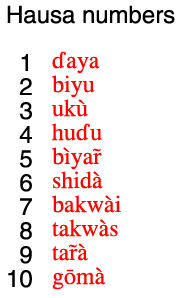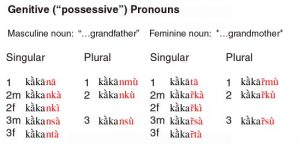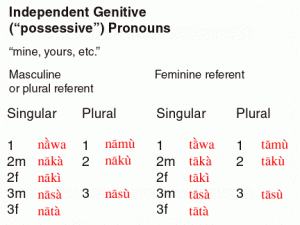Hausa noun modifiers
Nouns modified by adjectives and other words expressing qualities:
Comments on “Quality” Words in Hausa
English expresses qualities almost entirely using adjectives (‘white cow’, ‘strong cow’, ‘hungry cow’, etc.). Hausa does have some adjectives, but most qualities are expressed using nouns corresponding to English ‘strength’, ‘hunger’, etc. When modifying a noun by some quality word in Hausa, the construction will differ depending on whether the quality word is an adjective or a noun.
- Adjective: farar saniya ‘white cow’
- Noun: saniya mai k’arfi ‘strong cow’ (“cow having strength“)
Nouns Modified by Adjectives: ‘White Cow’
The most commonly heard way of modifying a noun by an adjective is as follows:
- Placement: the adjective precedes the noun
- Form: the adjective agrees in gender or plurality with the noun
- Linker: the adjective carries the “linker” (-r for feminine nouns, -n for masculine or plural)
| Masculine nouns | farin rago dogon yaro sabon littafi |
‘white ram’ ‘tall boy’ ‘new book’ |
| Feminine nouns | farar saniya doguwar yarinya sabuwar takarda |
‘white cow’ ‘tall girl’ ‘new paper’ |
| Plural nouns | fararen shanu dogwayen yara sababbin littattafai |
‘white cows’ ‘tall children’ ‘new books’ |
The word order Noun + Adjective is also possible. Using this order, the adjective must agree with the noun in gender or plurality, but no linker connects the noun and adjective. The meaning is essentially the same as the Adjective + Noun order, though the Noun + Adjective order tends to place emphasis on the adjective, i.e. ‘a WHITE cow’ rather than ‘a BLACK cow’.
| Masculine nouns | rago fari yaro dogo littafi sabo |
‘white ram’ ‘tall boy’ ‘new book’ |
| Feminine nouns | saniya fara yarinya doguwa takarda sabuwa |
‘white cow’ ‘tall girl’ ‘new paper’ |
| Plural nouns | shanu farare yara dogwaye littattafai sababbi |
‘white cows’ ‘tall children’ ‘new books’ |
Nouns Modified by Nouns Expressing Qualities: ‘Strong Cow’
Hausa expresses most concepts involving “qualities” using nouns rather than adjectives.
To use a quality noun as a modifier of another noun, the words are linked using mai ‘possessor of…’ for singular nouns (both masculineand feminine) and masu ‘possessors of…’ for plural nouns, i.e. the literal translation of the Hausa expression meaning ‘strong cow’ would be ‘cow possessor of strength’.
| Singular nouns | jaki mai k’arfi saniya mai k’arfi yaro mai wayo yarinya mai wayo |
‘strong donkey‘ ‘strong cow‘ ‘clever boy‘ ‘clever girl‘ |
| Plural nouns | shanu masu k’arfi yara masu wayo |
‘strong cattle‘ ‘clever children‘ |
A few expressions using quality nouns may take the form Noun-linker Quality noun. There are essentially fixed expressions, not a method of modification can be used with just any noun + any quality noun.
| ruwan sanyi ruwan zafi lemon zak’i lemon tsami mutumin kirki mutumin banza |
‘cold water’ ‘hot water’ ‘orange‘ (“citrus-ofsweetness“) ‘lime‘ (“citrus-ofsourness“) ‘nice person’ ‘worthless person’ |
Nouns Modified by Numbers
In Hausa, the number follows the noun it modifies. In Kano Hausa, animate nouns generally require the plural form of the noun with numbers above ‘one’. Inanimate nouns often use the singular form even with numbers above ‘one’, though the plural form is also possible.

In Hausa, the number follows the noun it modifies. In Kano Hausa, animate nouns generally require the plural form of the noun with numbers above ‘one’. Inanimate nouns often use the singular form even with numbers above ‘one’, though the plural form is also possible.
| saniya d’aya shanu biyu mutum d’aya mutane biyar gida goma or gidaje goma kujera ashirin or kujeru ashirin |
‘one cow’ ‘two cows’ ‘one person’ ‘five people’ ‘ten houses’ ‘twenty chairs’ |
The word nawa? ‘how many?, how much?’ is just like a number in terms of its position and requirements on plural forms of nouns.
| shanu nawa? mutane nawa? gida nawa? or gidaje nawa? kujera nawa? or kujeru nawa? |
‘how many cows?’ ‘how many people?’ ‘how many houses?’ ‘how many chairs?’ |
There is one situation where the plural form of the noun is not used. This is when thing modified by the number represents a unit, such as a quantity of money, a quantity of purchased items, or a span of time.
| Naira hamsin Naira nawa? kashi uku buhu goma shekara ashirin shekara nawa? wata biyu |
not *Nairori hamsin not *Nairori nawa? (kashi has no commonly used plural) not *buhuna goma not *shekaru ashirin not *shekaru nawa? not *watanni biyu |
Determiners
‘the chair’, ‘this chair’, ‘a (certain) chair’, ‘another chair’
Genitives (“possessors”)
Comments on the use of Genitive (“possessive”) Constructions
A genitive or “possessive” construction has the following form in Hausa:
Possessed-“linker” Possessor (or better, Modified-“linker” Modifier)
The general term “genitive” is preferable to the term “possessive” since the genitive construction signals many kinds of relations between words other than “possession”. A few examples are the following. The genitive “linker” is in red.
| Possession Social relation Origin Material Source Function Instrument Dimension Type Part-whole Subject of a verbal noun Object of a verbal noun |
littafin Zainab k’awar Zainab mutumin Kano dokin k’arfe man gyad’a tukunyar miya maganin tari tsawon mutum ruwan sama, ruwan sha k’otar fatanya zuwan Zainab ganin Zainab |
‘Zainab’s book’ ‘Zainab’s friend’ ‘person from Kano’ ‘horse of iron’ (= “bicycle”) ‘peanut oil’ ‘pot for (making) sauce’ ‘remedy for a cough’ ‘height of a man’ ‘water of sky’ (=”rain”)’, ‘drinking water’ ‘handle of a hoe’ ‘Zainab’s arrival’ ‘seeing Zainab’ |
Genitive Constructions Consisting of Two Nouns: ‘Zainab’s Friend’
Two things show that words are in a genitive construction:
- The order of the words (“possessed” or “modified” noun before “possessor” or “modifier”)
- The gentive “linker” between the words
The “linker”: Words in a genitive construction (as well as certain other constructions, such as adjective + noun) always have a “linker” with one of the following forms:
- Trilled -r if the “possessed” or “modified” noun is feminine
- -n if the “possessed” or “modified” noun is masculine or plural
Pronunciation of the feminine linker “-r”: Although the feminine linker is written -r and CAN be pronounced as “r”, in speech it is almost always pronounced as a doubling of the next consonant. (This is actually a general feature of Hausa trilled “r”, i.e. any trilled “r” can take this pronunciation.) Thus, the following pronunciations are options, with the right-hand form being the more common in speech. Note that if the second is written as beginning with a vowel, in speech one hears a double glottal stop, since all words written with a vowel in Hausa are actually pronounced with a glottal stop:
| k’awar Zainab matar Salisu kujerar malam k’ofar gida ‘yar Audu |
= k’awaz Zainab = matas Salisu = kujeram malam = k’ofag gida = ‘ya‘ ‘Audu |
‘Zainab’s friend’ ‘Salisu’s wife’ ‘the teacher’s chair’ ‘door of the house’ ‘Audu’s daughter’ |
Examples of Noun + Noun genitives
| Masculine modified noun | abokin Musa sunan matarka hoton yara |
‘Musa’s friend’ ‘you wife’s name’ ‘picture of the children’ |
| Feminine modified noun | k’awar Zainab jakar mijinki jaridar talakawa |
‘Zainab’s friend’ ‘your husband’ bag’ ‘a newspaper for the commoners’ |
| Plural modified noun | abokan Musa hotunan matarka idanun dabbobi |
‘Musa’s friends’ ‘pictures of your wife’ ‘eyes of animals’ |
Genitive Constructions Consisting of a Noun Plus a Pronoun: ‘her friend’
Genitive constructions with a pronoun modifier or “possessor” use a special set of genitive pronouns in a construction of the following form:
Noun-“linker”-genitive pronoun

Note that the first person singular genitive pronoun is just the vowel -a and the feminine linker with first person singular is -t- rather than -r, as in all other genitive constructions.
Technical Remarks on the Feminine Linker
Compare the form of the masculine and feminine linkers in the following phrases. The linkers are in red:
| Masculine |
Feminine | |||
| abokin d’alibi abokinka abokina |
‘friend of the student’ ‘your (m) friend’ ‘my friend’ |
k’awar d’aliba k’awarka k’awata |
= k’awad’ d’aliba = k’awakki = k’awata |
‘friend of the student’ ‘your (f) friend’ ‘my friend’ |
The masculine linker is pronounced “n” in every phrase. The feminine linker, on the other hand, is pronounced as either “r” or as a doubling of the next consonant in the first two phrases, but it is always pronounced “t” with the first person genitive pronoun -a.
The reason for this is that Hausa does not allow most consonants, including the consonant “t”, to come at the end of a syllable. The feminine linker was originally “t” in all situations. As the language developed the restriction against certain consonants coming at the end of a syllable, the originally “t” turned into “r” when at the end of a syllable, as in the first two phrases above, where the consonant following the linker begins a new syllable.
But in the case of the first person singular pronoun -a, the feminine linker “t” was NOT at the end of a syllable, i.e. it BEGAN the syllable which had the -a pronoun as its vowel. It therefore did not become “r” in just this one case.
How “real” is the pronoun -a in modern Hausa: The explanation above is the historical reason for why Hausa today has genitive constructions with first person singular -n-a masculine and -t-a feminine. Evidence for this analysis comes both from within Hausa and from related languages. There is some question, however, whether this analysis is “real” in the minds of Hausa speakers today. It seems that many (maybe most or even all?!) Hausa speakers see Hausa as having two special first person singular genitive pronouns -na and -ta, i.e. in these cases the n and t are just part of the pronoun, not the linker. From the purely analytical point of view of the linguist, this is “wrong”, but from the psychological standpoint of speakers of a language, the linguist’s analysis is often irrelevant to the way they think about and speak their language!
Placing Emphasis on the Genitive Pronoun
In order to emphasize the pronoun in a genitive phrase, a special construction is available:
Independent genitive pronoun + Noun-“Previous Reference Marker”

| Masculine referent | nasa abokin nawa mijin nasu gidan |
‘HIS friend’ ‘MY husband’ ‘THEIR house’ |
| Feminine referent | tata k’awar tawa matar tasu saniyar |
‘HER friend’ ‘MY wife’ ‘THEIR cow’ |
| Plural referent | naka abokan nawa ‘ya’yan nasu shanun |
‘YOUR friend’ ‘MY children’ ‘THEIR cattle’ |
Independent Genitives: ‘Zainab’s’, ‘hers’
When the “possessed” or “modified” noun is understood and only the “possessor” or modifier is expressed, the independent genitive takes the following forms:
Masculine or plural referent: na + “possessor/modifier”
Feminine referent: ta + “possessor/modifier”
| Masculine or plural referent | na Zainab na Musa na mutane |
‘Zainab’s’ ‘Musa’s’ ‘the people’s’ |
| Feminine referent | ta Zainab ta Musa ta mutane |
‘Zainab’s’ ‘Musa’s’ ‘the people’s’ |
The independent gentive pronouns take basically the same form, but the na or ta have long vowels, and the first person singular has a Low-High tone pattern rather than High-Low as in other persons.
Ordinal Numbers: ‘first’, ‘second’, etc.
Ordinal numbers (‘first’, ‘second’, etc.) are expressed using independent genitive na (masculine or plural) and ta(feminine) plus a cardinal number. ‘First’ has a special form, farko or fari ‘beginning’, though d’aya ‘one’ can also be used in the ordinal construction to mean ‘first’.
| Masculine or plural | Feminine | |
| na farko/fari, na d’aya na biyu na goma |
ta farko/fari, ta d’aya ta biyu ta goma |
‘first’ ‘second’ ‘third’ |

